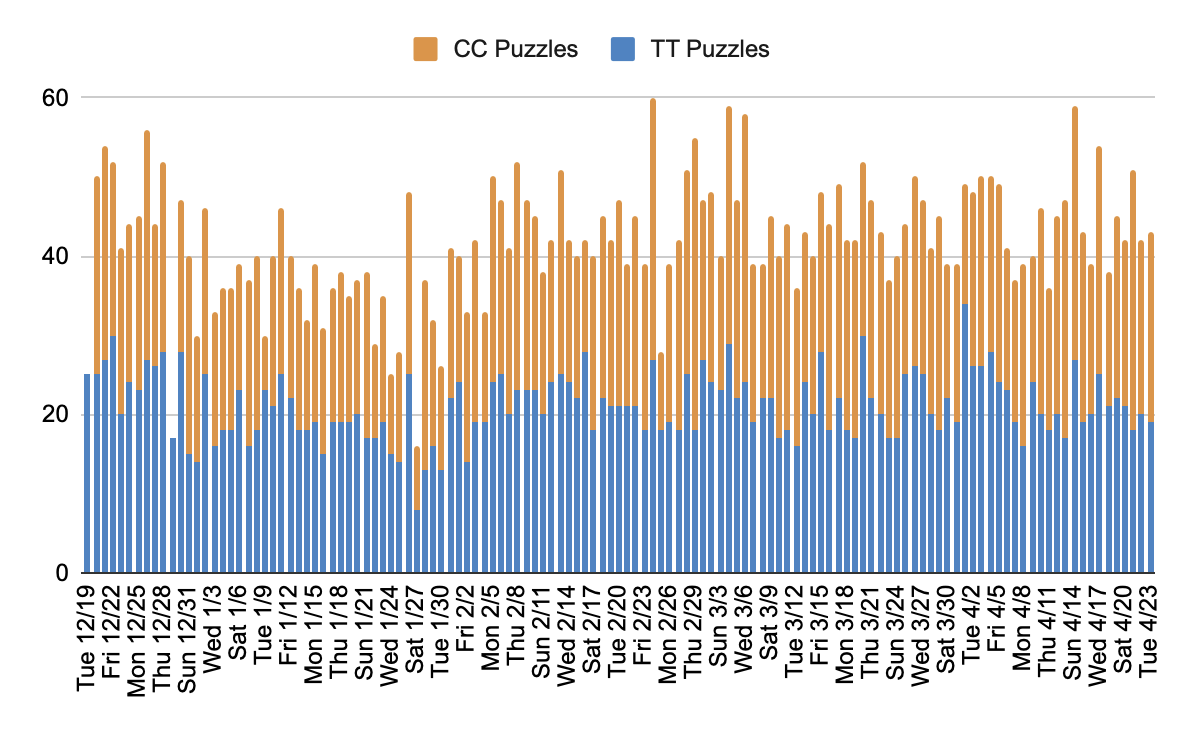This was also published on the MattPlaysChess Substack. Join me there!
Introduction
 {:height 530, :width 522}
{:height 530, :width 522}
While Chessable is often celebrated for its sophisticated approach to studying opening lines, its real game-changer for players around my level is its robust tactics training. At this stage, mastering tactics is more crucial than intricate opening theory. Tactical prowess directly influences the outcome of games by helping players recognize and exploit immediate opportunities or threats, which is essential for improving and winning more consistently.
This shift in focus began in 2021 after I was inspired by Alex Crompton’s blog post, where he detailed his rapid improvement from 300 to 1500 in just nine months. His journey underscored the pivotal role of solid tactical training, prompting me to adopt a similar approach. Over the past few years, I’ve refined this process, discovering what truly works in the realm of tactics for intermediate players like myself. In this post, I’ll share those insights, hoping to help others on their path to chess improvement.
Why Chessable Over Other Platforms?
The reason I like Chessable over other puzzle platforms is the spaced repetition aspect. Spaced repetition is a learning technique that involves increasing intervals of time between subsequent review of previously learned material to exploit the psychological spacing effect.
I think there is some debate over the importance of this in studying tactics. Do you try for many unique puzzles? Or try to master a smaller set of puzzles that you do over and over?
The problem I have with other platforms, like Chess.com puzzles, is that when I get one wrong I don’t take time to figure out why. I just move on. This also incentivizes me to guess on moves because there is no real reward for getting it right.
By repeating puzzles until I get them right multiple times in a row, I am forcing myself to really stop and think about the puzzles because I want to get them right so I don’t see them again.
Have you experienced similar challenges on other platforms? How do you deal with them?
My Spaced Repetition Schedule
I am currently working on 2 different tactics courses on Chessable, one that groups tactics by theme, and one that is just a mix of any tactics. More on that in a minute.
For each course, I set custom schedules. That is:
Level 1: 1 Day 16 Hours
Level 2: 3 Days 16 Hours
Level 3 (and beyond): 900 days
This means that I have to get the puzzle right 3 times in a week and then I never see it again. I just picked 900 days because it is way out in the future, hopefully after I’ve finished the course and moved on.
I had the case where I would see the same puzzle 5, 6, or 7 times and basically just have it memorized, not really spotting tactics. It also meant that I was mostly reviewing previous puzzles, and not being exposed to new things. That’s why I went to this condensed schedule.
I also give myself 30 seconds to solve the puzzle. I’ve found this is a good balance for me between forcing myself to spot tactics quickly but also giving me enough time to check out the position without feeling like I need to make the first move I see.
For all the other settings, check out the blog post by Alex Crompton, because he does a great job talking about setting up Chessable for tactics.
Tracking Progress: Time and Puzzles

One thing that I’ve been doing over the past 4 months is tracking the amount of time and the number of puzzles I’ve seen.
I’ve seen about 5500 total puzzles in that time. I say “about” because Chessable doesn’t really tell you how many puzzles you do. It tells you how many moves you have to review, and each puzzle could have multiple moves. Since it doesn’t matter that much, I just estimate to get a number.
This was about 30 hours total!
Daily Routine
First of all, I do tactics for 20-30 minutes every day. I’m talking every… single… day. Stay tuned for a post on my Chessable streak. The point for me is consistency and habits. It is much easier for me to wake up every day and know that I have to do tactics almost before I do anything else. I don’t have to think about making time to do the work, it is just part of my day.
I review every open line on my 2 tactics courses. To get the chart above, I record how many moves I have to review in each.
If I have less than 40 moves to review on either course, then I add 10 new puzzles. Typically I have between 30 and 50 moves to review. Some days there are 80! But regardless, I always review every one.
My Favorite Tactics Courses on Chessable
Currently I am studying 2 Chessable courses:
Both of these are great! Tactics Time is a good collection of puzzles where you do not know the theme. Common Chess Patterns is grouped by theme like knight forks, double attack patterns, a bunch of checkmate patterns, and more.
My other favorite series is “Learn Chess The Right Way” by GM Susan Polgar. These are wonderful books and I especially like book 3:
I’d happily recommend you start with these, but if you have others they would work as well.
Conclusion
Reflecting on my journey with Chessable has not only shown me how much I’ve improved but also how much more enjoyable chess has become. Earlier this year, I participated in a local tournament, 2024 Minnesota Open Tournament, and experienced firsthand the fruits of my laborious tactics training. In more than one game, I was able to swiftly capitalize on simple tactical opportunities—like exploiting a pin or seizing a weak back rank. These moments weren’t just about winning; they were affirmations that the hours spent on Chessable were translating into real, tangible progress on the chessboard.
Whether you’re an aspiring player seeking to break through the beginner ranks or an intermediate enthusiast aiming to refine your tactical vision, Chessable offers the tools to achieve these goals. I encourage you to explore its courses and find what works best for you. Share your experiences, discuss your improvements, and let’s grow together in this fascinating world of chess tactics. If my journey can serve as motivation, then I’m more than happy to have shared it. Here’s to many more tactical wins on your horizon!